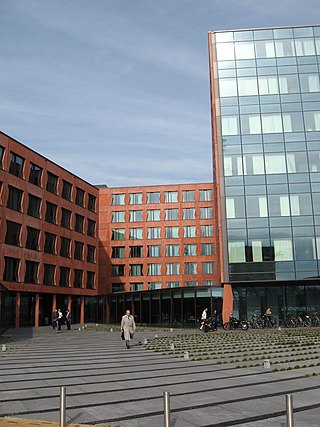
Edith Stein was a German Jewish philosopher who converted to Catholicism and became a Discalced Carmelite nun. She is canonized as a martyr and saint of the Catholic Church; she is also one of six patron saints of Europe.
Repertorium der Nederlandse Wijsbegeerte is one of the major works of Professor Dr. Johannes Jacobus Poortman. This is a four-volume inventory of all publications in the Netherlands or in the Dutch language or by Dutch philosophers on philosophy. After Poortman died in 1970 the work was continued by Wim Klever. Now it can be consulted on-line as the Kennisbank Filosofie Nederland (KFN).

The Vrije Universiteit Amsterdam is a public research university in Amsterdam, Netherlands, being founded in 1880. The VU Amsterdam is one of two large, publicly funded research universities in the city, the other being the University of Amsterdam (UvA). The literal translation of the Dutch name Vrije Universiteit is "Free University". "Free" refers to independence of the university from both the State and the Dutch Reformed Church. Both within and outside the university, the institution is commonly referred to as "the VU". Although founded as a private institution, the VU has received government funding on a parity basis with public universities since 1970. The university is located on a compact urban campus in the southern Buitenveldert neighbourhood of Amsterdam and adjacent to the modern Zuidas business district.

Statistics Netherlands, founded in 1899, is a Dutch governmental institution that gathers statistical information about the Netherlands. In Dutch it is known as the Centraal Bureau voor de Statistiek, often abbreviated to CBS. It is located in The Hague and Heerlen. Since 3 January 2004, Statistics Netherlands has been a self-standing organisation, or quango. Its independent status in law guarantees the reliable collection and dissemination of information supporting public debate, policy development and decision-making.
In metaphysics, the distinction between abstract and concrete refers to a divide between two types of entities. Many philosophers hold that this difference has fundamental metaphysical significance. Examples of concrete objects include plants, human beings and planets while things like numbers, sets and propositions are abstract objects. There is no general consensus as to what the characteristic marks of concreteness and abstractness are. Popular suggestions include defining the distinction in terms of the difference between (1) existence inside or outside space-time, (2) having causes and effects or not, (3) having contingent or necessary existence, (4) being particular or universal and (5) belonging to either the physical or the mental realm or to neither. Despite this diversity of views, there is broad agreement concerning most objects as to whether they are abstract or concrete. So under most interpretations, all these views would agree that, for example, plants are concrete objects while numbers are abstract objects.

Cultural Christians are nonreligious persons who adhere to Christian values and appreciate Christian culture. As such, these individuals usually identify themselves as culturally Christians, and are often seen by practicing believers as nominal Christians. This kind of identification may be due to various factors, such as family background, personal experiences, and the social and cultural environment in which they grew up.
Meta is a prefix meaning "more comprehensive" or "transcending".
Claudine Beccarie is a French pornographic actress of the 1970s. She has been called "the French Linda Lovelace" and she was described by The New York Times as being "one of France's most successful pornography performers."
Bastiaan Cornelis van Fraassen is a Dutch-American philosopher noted for his contributions to philosophy of science, epistemology and formal logic. He is a Distinguished Professor of Philosophy at San Francisco State University and the McCosh Professor of Philosophy Emeritus at Princeton University.

Isis is a quarterly peer-reviewed academic journal published by the University of Chicago Press. It covers the history of science, history of medicine, and the history of technology, as well as their cultural influences. It contains original research articles and extensive book reviews and review essays. Furthermore, sections devoted to one particular topic are published in each issue in open access. These sections consist of the Focus section, the Viewpoint section and the Second Look section.

Edward Nouri Zalta is an American philosopher who is a senior research scholar at the Center for the Study of Language and Information at Stanford University. He received his BA at Rice University in 1975 and his PhD from the University of Massachusetts Amherst in 1981, both in philosophy. Zalta has taught courses at Stanford University, Rice University, the University of Salzburg, and the University of Auckland. Zalta is also the Principal Editor of the Stanford Encyclopedia of Philosophy.
The modern division of philosophy into theoretical philosophy and practical philosophy has its origin in Aristotle's categories of natural philosophy and moral philosophy. The one has theory for its object, and the other practice.

Aloys (Alois) Jean Maria Joseph, Viscount Van de Vyvere was a Belgian Catholic Party politician.

Cartesianism is the philosophical and scientific system of René Descartes and its subsequent development by other seventeenth century thinkers, most notably François Poullain de la Barre, Nicolas Malebranche and Baruch Spinoza. Descartes is often regarded as the first thinker to emphasize the use of reason to develop the natural sciences. For him, philosophy was a thinking system that embodied all knowledge.

Philosophy is a systematic study of general and fundamental questions concerning topics like existence, reason, knowledge, values, mind, and language. It is a rational and critical inquiry that reflects on its own methods and assumptions.
The following outline is provided as an overview of and topical guide to the Renaissance:
The Linguistic Bibliography / Bibliographie Linguistique is an annual publication which first appeared in 1949. The publication provides comprehensive bibliographical descriptions of publications in theoretical linguistics, with about 20,000 items added per year. Since 2002, the database has also been available online, as Linguistic Bibliography Online, and contains data from 1993 onward.

The Philosophy Documentation Center (PDC) is a non-profit publisher and resource center that provides access to scholarly materials in applied ethics, classics, philosophy, religious studies, and related disciplines. It publishes academic journals, conference proceedings, anthologies, and online research databases, often in cooperation with scholarly and professional associations. It also provides membership management and electronic publishing services, and hosts electronic journals, series, and other publications from several countries.
The International Philosophical Bibliography (IPB), also known in French as Répertoire bibliographique de la philosophie (RBP), is a bibliographic database covering publications on the history of philosophy and continental philosophy.
Dutch philosophy is a broad branch of philosophy that discusses the contributions of Dutch philosophers to the discourse of Western philosophy and Renaissance philosophy. The philosophy, as its own entity, arose in the 16th and 17th centuries through the philosophical studies of Desiderius Erasmus and Baruch Spinoza. The adoption of the humanistic perspective by Erasmus, despite his Christian background, and rational but theocentric perspective expounded by Spinoza, supported each of these philosopher's works. In general, the philosophy revolved around acknowledging the reality of human self-determination and rational thought rather than focusing on traditional ideals of fatalism and virtue raised in Christianity. The roots of philosophical frameworks like the mind-body dualism and monism debate can also be traced to Dutch philosophy, which is attributed to 17th century philosopher René Descartes. Descartes was both a mathematician and philosopher during the Dutch Golden Age, despite being from the Kingdom of France. Modern Dutch philosophers like D.H. Th. Vollenhoven provided critical analyses on the dichotomy between dualism and monism.









